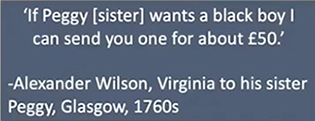|
The Jewish community has engaged in many discussions about race equality during the past year, and SCoJeC joined in the global discussion of slavery and the trans-Atlantic slave trade with an event exploring Glasgow’s role, and discussing Jewish teaching about slavery.
Marenka Thompson-Odlum, a Research Associate at the Pitt Rivers Museum in Oxford, who is currently researching Glasgow’s role in the trans-Atlantic slave trade at the University of Glasgow, has created a walking tour of the "second city of the Empire" focussing on iconic monuments and spaces that relate to the slave trade, and delving into the history of their benefactors to show how they had amassed their wealth through dealing in slavery. (Click here to see Marenka's virtual walking tour.)

|
While slavery was not particularly common in Scotland, Scottish merchants were infamous for their harsh practices as slave traders and exporters. As well as outlining these histories, Marenka revealed how Glasgow’s involvement in the harsh realities of the slave trade was redescribed as Scottish merchants saving ‘tribal’ peoples. Later, as sentiments changed, many wealthy families began to distance themselves from their businesses, even going as far as to burn all the records of their trade in slaves, and the media actively minimised Glasgow's involvement:
“The trading instinct of Glasgow was not to be denied, and, prompted no doubt by its favourable situation for the purpose, the merchants of Glasgow embarked largely in the West India (West Indies) trade … The reproach can never be levelled at our city, as it was at Liverpool, that there was not a stone in her streets that were not cemented with the blood of a slave.” (Glasgow Herald, 1 June 1883)
The second part of the evening was a discussion led by Bill Shackman, Honorary Chaplain to Jewish students at Saint Andrews University, who has previously taught in Chicago, Jerusalem, and elsewhere. Bill described how Jewish biblical texts were used both to justify and uphold the institution of slavery, and to condemn it and support emancipation.
In America in the run up to the Civil War, some rabbis justified slavery while others condemned it, but in 1853 the Foreign Anti-Slavery Society stated:
“Jews deem it their place to have everyone choose whichever side he may deem best to promote his own interest and the welfare of his country … They do not interfere in any discussion which is not material to their religion.”
Bill explained that the Torah provides rules about the welfare and fair treatment of slaves, but pointed out that these refer to a different type of slavery in payment for goods or to work off debt, not analagous to the trans-Atlantic slave trade, and quoted a sermon by Rabbi David Einhorn of Congregation Sinai in Baltimore in the 1860s, who saw the Bible as pointing the way towards the complete abolition of slavery. |